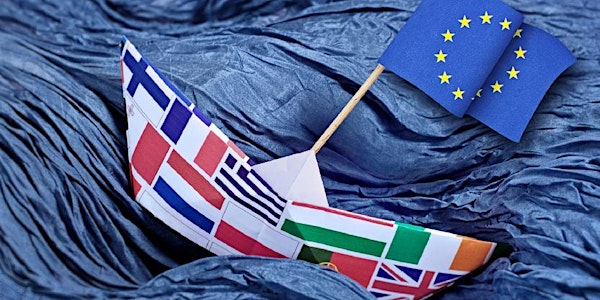
Integration or disintegration? Europe at the crossroads in 2016
Date and time
Location
Nissan Lecture Theatre
St Antony's College Oxford OX2 6JF United KingdomDescription

Not since its origins in the 1950s has the European Union (EU) faced such a dangerous concert of destabilizing events. In the wake of the Eurozone crisis (now quiescent but only partly resolved), in the middle of the migrant crisis (straining the EU’s consensus), and in the run up to the referendum on Britain in the EU (with implications for the cohesion and global influence of both the UK and the rest of the EU), the summer of 2016 could prove to be a crucial turning point for Europe’s destiny.
This conference at St Antony's College on the 28th April aims to analyse Europe’s developing existential crisis from the perspective of four countries: Germany, Greece, Poland and the United Kingdom. The first is a founding member of the EU, the rest are later arrivals in successive decades, and all of them had different reasons for joining. Two are members of the Eurozone, two are not. One is (for the moment) the undisputed hegemonic power in the EU, another finds itself returned to its historic role of semi-vassal state, while the other two operate in less obedient orbits around the centre. Few seem entirely happy in this constellation.
The conference is structured around three key themes:
i. What were the original ambitions of these four countries in joining the EU, to what extent have these been met, and what are their current concerns?
ii. What are we to make of the economic and financial architecture of the EU—is it doomed or will it work—and how does all this fit into the evolving globalized economy?
iii. In what way and how strongly do these four countries feel “European”, is there a common European identity which they (and other countries in Europe) can all recognize, and how does this square with nationalist identities? Is this European identity strong enough to meld the EU into “ever closer union” or not?
Conference participants will include historians, economists, and political scientists, from each of the four countries considered, in order to gain a genuinely European view. Participants will also be drawn from the University of Oxford’s own distinguished pool of experts, and include other speakers from elsewhere in the UK.
The conference will begin with two keynote speeches, from Chris Patten, the Chancellor of the University of Oxford, who will speak on the political vision for Europe, and from Willem Buiter, the Chief Economist of CitiGroup, who will speak on the economic vision for Europe.
The conference is being convened by Professors John Darwin, David Vines and Jan Zielonka of Oxford University, under the direction of the Political Economy of Financial Markets (PEFM) Programme at St Antony’s College, and is supported by CitiGroup, which is contributing to its funding. The conference has been organized in partnership between PEFM, the Oxford Martin School, the Oxford Centre for Global History, and the European Studies Centre (ESC), and forms part of a series of events in celebration of fortieth anniversary of the ESC. The conference follows a related event hosted by the Oxford Martin School on the 27th April.
Presentations will be On the Record, but Q and A will be under the Chatham House Rule.
PROGRAMME
9.30-10.00 Registration (Foyer, Hilda Besse Building)
10:00-10:15 Welcome
Welcome to St Antony’s College, Oxford, and presentation of rationale for the conference, from Margaret MacMillan (Warden of St Antony’s College) and Andrew Pitt (Citigroup, Head of Research)
10:15-11:15 Whither Europe?
Chair: Margaret MacMillan
Keynote speeches by Lord Patten (Political Vision) and Willem Buiter (Economic Vision)
11:15-11:35 Questions from the floor
11:35-11:55 Coffee break (Foyer, Hilda Besse Building)
11:55-13:10 Motivations, aspirations and level of satisfaction with the EU
Chair: John Darwin (History Faculty, Nuffield College, and Director of Oxford Centre for Global History)
Speakers: Timothy Garton Ash (University of Oxford), Ulrike Guérot (European School of Governance, Berlin), Ioannis Papadopoulos (University of Lausanne) and Bogusław Chrabota (Editor, Rzeczpospolita)
13:10-13:30 Questions from the floor
13:30-14:55 Lunch break (lunch not included)
14:55-16:10 Globalization, trade, financial crisis and EU
Chair : David Vines (Department of Economics, Balliol College, and Acting Director of PEFM)
Speakers: Ned Phelps (Columbia University), Otmar Issing (President, Centre for Financial Studies), George Pagoulatos (Athens University of Economics & Business), Hanna Gronkiewicz-Waltz (Mayor of Warsaw)
16:10-16.35 Questions from the floor
16:35-17.00 Coffee break (Foyer, Hilda Besse Building)
17:00-18:15 Europe, EU and nation-states: competing identities and loyalties
Chair: Jan Zielonka (Department of Politics and International Relations, St Antony’s College, and European Studies Centre)
Speakers: Simon Jenkins (Guardian), Christian Joppke (Bern University), Kalypso Nicolaïdis (University of Oxford), Ryszard Legutko (University of Kraków, MEP from PiS)
18:15-18:40 Questions from the floor
PLEASE NOTE: MEALS ARE NOT INCLUDED.
Organised by
The European Political Economy Project is a broad new initiative which aims to support the development of European economic institutions, by shedding light on the way these institutions, including macroeconomic policy frameworks, interact with markets and respond to domestic and global socio-political pressures. By promoting a better understanding of market and political constraints on institutions, it seeks to contribute to improving policy formulation and execution.
The project was established in October 2019 at the European Studies Centre (ESC), St Antony’s College, Oxford. It will be led by Charles Enoch, (ESC Fellow 2019-21), with the cooperation of Tim Vlandis (Governing Body Fellow); the Administrator is Julie Adams (ESC).
The project's main activities will be to carry out research, hold seminars and workshops, and publish findings in outlets that range from academic articles and books to policy briefings and op-ed pieces in the international press. In addition to events hosted at St Antony’s College, bringing together academics, officials, interest groups, and market participants, we plan to co-host workshops with other institutions, and provide policy findings to relevant agencies. The project's activities will be closely aligned with the core agenda of the ESC and will exploit synergies with the multi-disciplinary expertise in the rest of the ESC.